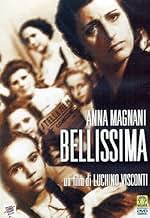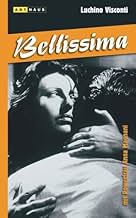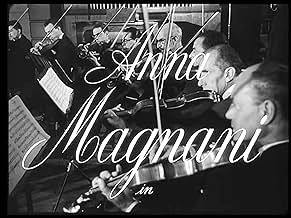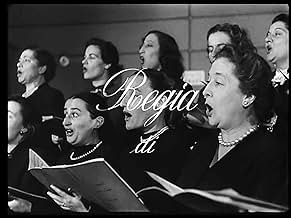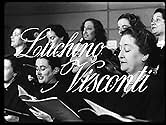IMDb-BEWERTUNG
7,7/10
5878
IHRE BEWERTUNG
Eine Frau aus der Unterschicht, die verzweifelt versucht, ihre Tochter zum Film zu bringen.Eine Frau aus der Unterschicht, die verzweifelt versucht, ihre Tochter zum Film zu bringen.Eine Frau aus der Unterschicht, die verzweifelt versucht, ihre Tochter zum Film zu bringen.
- Auszeichnungen
- 1 Gewinn & 1 Nominierung insgesamt
Liliana Mancini
- Iris
- (as Iris)
Vittorio Musy Glori
- Self
- (as Vittorio Glori)
Empfohlene Bewertungen
A wonderful, poignant masterpiece by the great Visconti and Anna-the-Great-Magnani. On the surface, it is a simple story about a mother's obsession to use her little daughter's appearance to escape the poverty of post-war Italy. What transpires is the cruel truth about the beauty- and illusion-making industry (cinema), with all its inherent cynicism, at a time when hunger for the daily bread was equaled by hunger for fantasy and beauty.
I've seen this movie only once, ages ago, and it still remains with me as one of the most unforgettable films I have ever seen. In a world that has seen hundreds of thousands of films that is no small feat.
I've seen this movie only once, ages ago, and it still remains with me as one of the most unforgettable films I have ever seen. In a world that has seen hundreds of thousands of films that is no small feat.
It was as if I had taken a time machine back to 1951. Sitting at the open theater of Tiberina Island in Rome, Anna Magnani's voice bounced off the ancient angles of this stunning roman spot. "Bellissima" is a timeless masterpiece. A rarity in Visconti's oeuvre. He puts all of his uncanny attention to detail to the service of Magnani's bombastic, tender, funny, extraordinary performance. Visconti knew how to bring the best in his actors. Even Maria Callas who, under Visconti's guidance, went from the greatest Opera singer to the greatest actress singing Opera. There are moments in "Bellissima" that can only be described as a love letter from Visconti to Magnani and vice versa. She has a few close ups that tells us how much love, respect and admiration existed between this two enormous artists. Look at her moments in the mirror, combing her hair naturally, debating under her breath the proper pronunciation of a word. She, not a conventional beauty, looks ravishing. The message about the dangers of immediate fame and fortune could have been written today. If you have a chance, don't miss it. If you love film, it's a must!
If you see only one film by Anna Magnani, see BELLISSIMA. The is "La Magnani" at her comic best. Get the video with English subtitles because even if your italian is good, the verbal onslaught is thick and fast. Preferably one should see this film on the big screen to get the full impact of Magnani's performance. She plays a stage mother who is trying to get her young, tiny little girl into the movies. Magnani's warmth, wit, slyness and sheer volcanic beauty leap from the screen. I am amazed that Hollywood has not re-made this film. It would be the perfect vehicle for Barbra Streisand or Bette Midler and would assure them of an Oscar nomination. Unlike her English language roles, such as "The Rose Tattoo" or "The Secret of Santa Vittoria", in BELLISSIMA Magnani acts in her native italian voice. It makes all the difference in the world. When she acted in English, she was stilted and restrained; the language barrier, although she made super-human, heroic efforts to master English, is nonetheless felt. But in her native tongue, Magnani lets loose with a bravura performance. I defy anyone not to fall in love with her after watching BELLISSIMA.
'They do not make movies like those anymore' is a saying that makes me smile. Of course, it is true. For the good and for the bad. The technical means, the tastes of the audiences, the style of acting, and many more have changed over the 120 years of cinema history. The reciprocal saying is also true: "Then, they were not making movies like we have today". Also for the good and for the bad. Watching movies like 'Bellissima' makes me think that there also are a few important things that stayed the same. Many viewers, when watching a movie, look for emotions and sincerity, want to see a well-told story, with characters that they understand and identify with. For these viewers, good movies had, have, and will have these qualities. It's the case of Luchino Visconti's 'Bellissima', a 1951 film that succeeds to make us interested and emotional today, because of its cinematic and sentimental qualities, and through the magical acting of the actress around which the film is built: Anna Magnani.
There is a recurrent discussion in Hollywood about the need for strong female roles. Seeing this film and remembering a few other Italian films from the 50s or 60s ('The Nights of Cabiria', 'La Ciociara'), I believe that this discussion must have been entertained many times in history. It is true that Italian cinema has benefited from exceptional actresses such as Giulietta Masina, Sophia Loren, or Anna Magnani. In 'Bellissima' two very popular themes and styles meet: the movies about movies industry, a constant in the cinema history, and the Neo-realism of the Italian cinematography between 1945 and 1960. Maddalena Cecconi, the main heroine of the film, lives in a poor neighborhood of Rome together with her husband and their six-year-old daughter. Both spouses work from dawn to night, but hardly manage to cover the cost of living. Cinema is part of their life, outdoor projections in the inner courtyard of the multi-storey apartments building where they live on rent is both entertainment and existential surrogate, transporting viewers into the imaginary worlds on the big screen. When a competition is announced at the Cinecittà studios for a child role that will be attributed to the most beautiful girl in Rome, Maddalena immediately sees the opportunity to change the life of her little girl, break the economic and social barriers, move her into the dream world. She will be ready to do everything or almost everything to get the little girl succeed, but here she will face another layer of social reality. The world of cinema is far from the ideal that viewers see on screen. It is a world in many ways more ruthless and more unequal than the one of the proletarian neighborhoods. The political convictions of Visconti, one of the most radical Neo-realists, are expressed in this film without hesitations or ambiguities.
The film has many qualities that make it pass the exam of time. The script is very well written, the characters are well drafted forming a true social mosaic, the story does not linger at any moment, and humor is also present, probably in a higher dose than in any other Visconti movie. But above all we have Anna Magnani's fascinating acting performance. She is passionate and obsessed with protecting her daughter, sensual and dignified, she burns on the screen. To emphasize her acting, Luchino Visconti uses an original cinematic technique, and I wonder if a director today would have the courage to adopt it in a contemporary movie: he fixes the camera on the heroine figure, even in motion scenes or in dialogues . Sometimes he seems to have forgotten to change plans, but of course, everything is intentional. Beautiful, expressive, modern! 'Bellissima' is a movie that manages to create emotion, but also an acute social critique directed against the exploitation of children in the film world. And if that was the case, the little girl who played in the film as Anna Magnani's daughter started and ended her acting career with this movie, never to return to act in another role!
There is a recurrent discussion in Hollywood about the need for strong female roles. Seeing this film and remembering a few other Italian films from the 50s or 60s ('The Nights of Cabiria', 'La Ciociara'), I believe that this discussion must have been entertained many times in history. It is true that Italian cinema has benefited from exceptional actresses such as Giulietta Masina, Sophia Loren, or Anna Magnani. In 'Bellissima' two very popular themes and styles meet: the movies about movies industry, a constant in the cinema history, and the Neo-realism of the Italian cinematography between 1945 and 1960. Maddalena Cecconi, the main heroine of the film, lives in a poor neighborhood of Rome together with her husband and their six-year-old daughter. Both spouses work from dawn to night, but hardly manage to cover the cost of living. Cinema is part of their life, outdoor projections in the inner courtyard of the multi-storey apartments building where they live on rent is both entertainment and existential surrogate, transporting viewers into the imaginary worlds on the big screen. When a competition is announced at the Cinecittà studios for a child role that will be attributed to the most beautiful girl in Rome, Maddalena immediately sees the opportunity to change the life of her little girl, break the economic and social barriers, move her into the dream world. She will be ready to do everything or almost everything to get the little girl succeed, but here she will face another layer of social reality. The world of cinema is far from the ideal that viewers see on screen. It is a world in many ways more ruthless and more unequal than the one of the proletarian neighborhoods. The political convictions of Visconti, one of the most radical Neo-realists, are expressed in this film without hesitations or ambiguities.
The film has many qualities that make it pass the exam of time. The script is very well written, the characters are well drafted forming a true social mosaic, the story does not linger at any moment, and humor is also present, probably in a higher dose than in any other Visconti movie. But above all we have Anna Magnani's fascinating acting performance. She is passionate and obsessed with protecting her daughter, sensual and dignified, she burns on the screen. To emphasize her acting, Luchino Visconti uses an original cinematic technique, and I wonder if a director today would have the courage to adopt it in a contemporary movie: he fixes the camera on the heroine figure, even in motion scenes or in dialogues . Sometimes he seems to have forgotten to change plans, but of course, everything is intentional. Beautiful, expressive, modern! 'Bellissima' is a movie that manages to create emotion, but also an acute social critique directed against the exploitation of children in the film world. And if that was the case, the little girl who played in the film as Anna Magnani's daughter started and ended her acting career with this movie, never to return to act in another role!
Anna Magnani is magnificent as a pushy show-biz mother determined to get her daughter into the movies. She's like an early prototype of Bette Midler but she's more down-to-earth and with a greater propensity for feeling. (Midler could do the comedy but not the pathos). The film is charming but for a Visconti movie, it's slight. It's a great director's trifle about the movies; he enjoys poking fun at the stereotypes he's worked with in more serious films. It's laugh out loud funny.
The film doesn't offer any insights into the movie-making process and even the wheeling and dealing seems perfunctory. At times you wish maybe Visconti had gone a little deeper. (At the end he makes a point that the movies can be shallow but we know that already). Take Magnani out of the equation and there really isn't much left. She's the life-force that holds it together. It really is a great piece of acting.
The film doesn't offer any insights into the movie-making process and even the wheeling and dealing seems perfunctory. At times you wish maybe Visconti had gone a little deeper. (At the end he makes a point that the movies can be shallow but we know that already). Take Magnani out of the equation and there really isn't much left. She's the life-force that holds it together. It really is a great piece of acting.
Wusstest du schon
- WissenswertesIn the final scene, Anna Magnani hears the film playing outside her room and remarks that she hears Burt Lancaster. Magnani would win an Oscar four years later for The Rose Tattoo, in which she would costar with Lancaster.
- VerbindungenEdited into Al Centro del cinema (2015)
Top-Auswahl
Melde dich zum Bewerten an und greife auf die Watchlist für personalisierte Empfehlungen zu.
- How long is Bellissima?Powered by Alexa
Details
- Erscheinungsdatum
- Herkunftsland
- Sprache
- Auch bekannt als
- Die Schönste
- Drehorte
- Ristorante Al Biondo Tevere, Via Ostiense, 178, Roma RM, Italien(Trattoria by the River Tiber)
- Produktionsfirma
- Weitere beteiligte Unternehmen bei IMDbPro anzeigen
- Laufzeit
- 1 Std. 55 Min.(115 min)
- Farbe
- Seitenverhältnis
- 1.37 : 1
Zu dieser Seite beitragen
Bearbeitung vorschlagen oder fehlenden Inhalt hinzufügen


